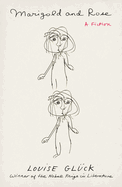
With Marigold and Rose, her first foray into fiction, poet Louise Glück (The Wild Iris) gives readers a distinctive look at both innocence and experience through the eyes (and minds) of infant twins during their first year of life.
Glück chooses each word carefully and leaves only the necessary and true on the page, so Marigold and Rose is a decidedly slim volume, but it holds a wealth of insight. The narrative opens with "Marigold was absorbed in her book; she had gotten as far as the V," and progresses in an alternating close third-person, bouncing between the twins and their particular personalities. Though the twins are named, Father and Mother remain abstractions, vital but vague and formless. The children, however, are fully formed: Marigold is quiet and observant, already a writer ("That she couldn't read was an impediment. Nevertheless, the book was forming in her head"); Rose "was a social being," eager to please, quick to smile. Both see the other as central to their emerging story.
This short novel is inspired by the author's grandchildren, born during the lockdowns, which meant Glück observed their first year from a distance, via video. Under those circumstances, it would be easy for Marigold and Rose to slip into sentimentality. Instead, the simplicity of the subject matter serves to elevate each moment of brilliance. The babies are bathed, they sleep in separate cribs, they learn to drink from a cup--all ordinary moments that are somehow transfigured. In this way, the novel becomes a reflection on life, learning, time and always--always--the choosing of just the right words. --Sara Beth West, freelance reviewer and librarian

